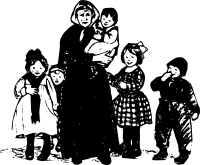Associations to the word «Generation»
Noun
- Trek
- Electricity
- Sequencing
- Younger
- Transformer
- Descendant
- Posterity
- Biomass
- Sedan
- Grandparent
- Mitsubishi
- V6
- Toyota
- Mazda
- Allele
- Per
- Offspring
- Styling
- Volkswagen
- Progeny
- Nissan
- Honda
- Ancestor
- Console
- Chevrolet
- Breeding
- Turbine
- Voyager
- Immigrant
- Reactor
- Microprocessor
- Stallion
- Spectrometry
- Audi
- Kung
- Transmission
- Processor
- Progenitor
- Hyundai
- Third
- Genealogy
- Intel
- Fifth
- Adult
- Lineage
- Sixth
- Irrigation
- Grandchild
- Intellectual
- Kinship
- Fourth
- Assimilation
- Germ
- V8
- Confucius
- Hybrid
- Amplification
- Cohort
- Cpu
- Throughput
- Modernism
- Coupe
- Contemporary
- Phenotype
- Inheritance
- Nintendo
- Gs
- Thinker
- Emission
- Volvo
- Mutation
Adjective
Pictures for the word «Generation»
Wiktionary
GENERATION, noun. The fact of creating something, or bringing something into being; production, creation. [from 14th c.]
GENERATION, noun. The act of creating a living creature or organism; procreation. [from 14th c.]
GENERATION, noun. (now US regional) Race, family; breed. [from 14th c.]
GENERATION, noun. A single step or stage in the succession of natural descent; a rank or degree in genealogy, the members of a family from the same parents, considered as a single unit. [from 14th c.]
GENERATION, noun. (obsolete) Descendants, progeny; offspring. [15th-19th c.]
GENERATION, noun. The average amount of time needed for children to grow up and have children of their own, generally considered to be a period of around thirty years, used as a measure of time. [from 17th c.]
GENERATION, noun. A set stage in the development of computing or of a specific technology. [from 20th c.]
GENERATION, noun. (geometry) The formation or production of any geometrical magnitude, as a line, a surface, a solid, by the motion, in accordance with a mathematical law, of a point or a magnitude; as, the generation of a line or curve by the motion of a point, of a surface by a line, a sphere by a semicircle, etc.
GENERATION, noun. A specific age range in which each person in that range can relate culturally to one another.
GENERATION, noun. A version of a form of pop culture which differs from later or earlier versions.
GENERATION GAP, noun. A disconnect between members of one generation and members of the next based on the later generation developing habits, attitudes, and preferences inconsistent with the experience of the former.
GENERATION GAPS, noun. Plural of generation gap
GENERATION JONES, proper noun. The generation of people born in the late 1950s and early 1960s, sandwiched between baby boomers and Gen-Xers.
GENERATION LOSS, noun. (electronics) The loss of quality between copies, usually associated with magnetic audio and video media.
GENERATION X, proper noun. The generation of people born after the baby boom that followed World War II, especially those born in the 1960s and 1970s
GENERATION Y, proper noun. The generation of people born in the 1980s and 1990s.
GENERATION Z, proper noun. The generation of people born in the 1990s and 2000s.
Dictionary definition
GENERATION, noun. All the people living at the same time or of approximately the same age.
GENERATION, noun. Group of genetically related organisms constituting a single step in the line of descent.
GENERATION, noun. The normal time between successive generations; "they had to wait a generation for that prejudice to fade".
GENERATION, noun. A stage of technological development or innovation; "the third generation of computers".
GENERATION, noun. A coming into being.
GENERATION, noun. The production of heat or electricity; "dams were built for the generation of electricity".
GENERATION, noun. The act of producing offspring or multiplying by such production.
Wise words
Don't you know this, that words are doctors to a diseased
temperment?

